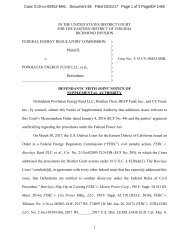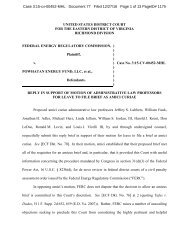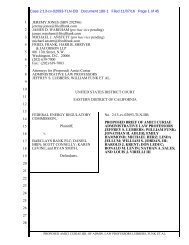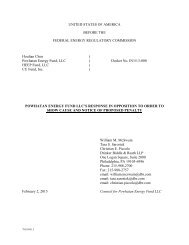FERC-Response-03-24-17
FERC-Response-03-24-17
FERC-Response-03-24-17
Create successful ePaper yourself
Turn your PDF publications into a flip-book with our unique Google optimized e-Paper software.
Case 3:15-cv-00452-MHL Document 84 Filed <strong>03</strong>/<strong>24</strong>/<strong>17</strong> Page 8 of 30 PageID# 1427<br />
A. The FPA is not a “hybrid regime.”<br />
Amici express concerns about administrative enforcement programs employing so-called<br />
“hybrid regimes” whereby “agencies would assess civil penalties without a formal APA-style<br />
hearing, and the only judicial review of the agency’s assessment was deferential, being limited to<br />
substantial evidence or arbitrary and capricious standards. In other words, under these hybrid<br />
regimes, the defendant ‘does not receive a full trial anywhere.’” Amici Br. at 7 (citation<br />
omitted). Amici caution that such regimes are “contrary to the considered judgment of the<br />
ACUS and [have] been roundly criticized.” Amici Br. at 7. Amici’s implication is that the<br />
Petitioner’s interpretation of the FPA would render it such a “hybrid regime.” They are<br />
mistaken: the FPA clearly provides the option of a “full trial,” by giving respondents the<br />
opportunity for a formal adjudication before an ALJ under Section 31(d)(2).<br />
The ACUS’s concern has not been with regimes allowing such a choice. The ACUS’s<br />
1993 Recommendations disapproved of enforcement regimes that allowed for the imposition of<br />
civil penalties “without a formal APA hearing, without an ALJ, and without de novo judicial<br />
review.” ACUS Rec. 93-1, Use of APA Formal Procedures in Civil Money Penalty Proceedings,<br />
58 Fed. Reg. 4509, at 2-3 (Aug. 30, 1993) (“ACUS Rec. 93-1”). The ACUS’s concerns focused<br />
on mid-1980s environmental legislation that authorized agencies to assess certain categories of<br />
civil penalties (particularly low-dollar penalties) administratively, without trial-type procedures,<br />
and with deferential review by the district courts. Id.; see also Funk, Close Enough for<br />
Government Work?, <strong>24</strong> SETON HALL L. REV. 1, at 3 and n.15 (1993). Professor Funk described<br />
the system as follows: once a respondent in a “hybrid regime” had penalties assessed against it<br />
by an agency, the respondent’s only recourse was a substantial evidence review before a Federal<br />
district court. Id. at 3. These statutory regimes stand in stark contrast to Section 31(d) of the<br />
FPA, which allows respondents the option of: (1) a trial-type proceeding under the APA<br />
3






